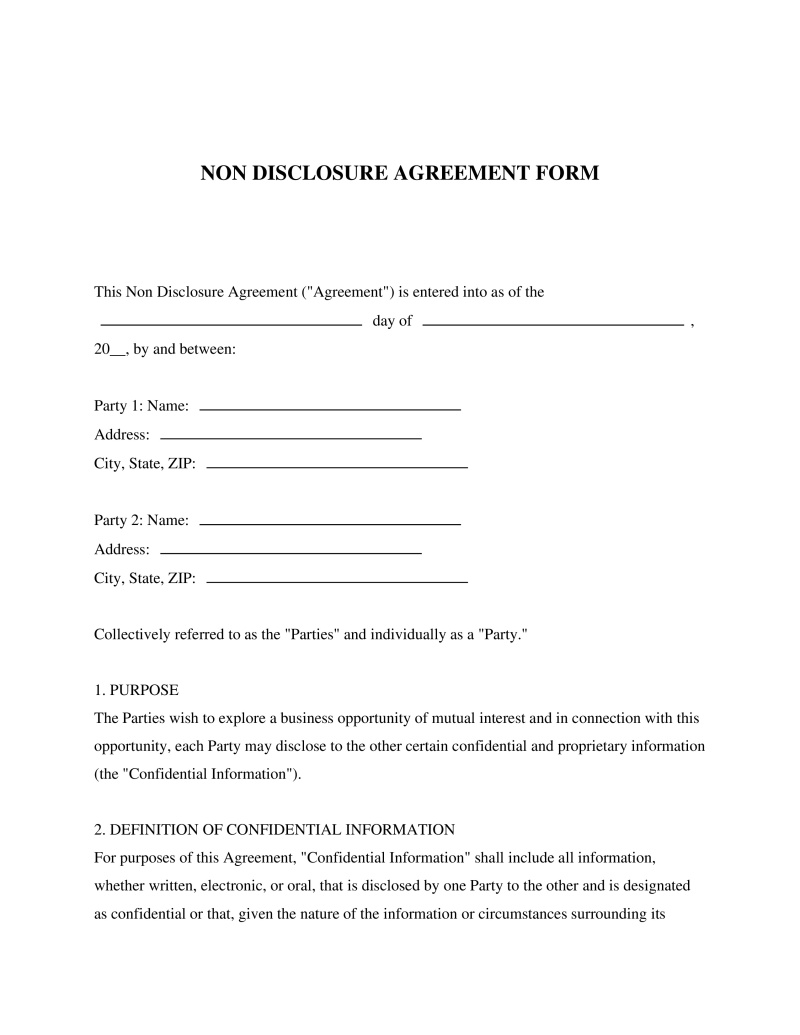A Non-Disclosure Agreement (NDA) is a legal document used to protect confidential information shared between parties during business dealings, collaborations, or sensitive transactions.
Party One Name
Full legal name of the first party involved

Table of Contents
What is a Non Disclosure Agreement?
A Non Disclosure Agreement (NDA) is a legally binding contract that establishes a confidential relationship. The parties to the agreement agree that sensitive information they may obtain will not be made available to any others. This document is crucial for individuals or businesses that wish to protect non-public business information, trade secrets, or any other sensitive details from being disclosed. NDAs are often employed in negotiations with potential partners, in discussions with prospective employees, or when entering into new business arrangements, ensuring that proprietary information shared during these engagements remains confidential and is not misused.
Key Features
Important Provisions
- Definition Clause: Clearly delineates what constitutes 'confidential information' under the agreement.
- Obligations Clause: Outlines the duties of the receiving party regarding non-disclosure and non-use of the information.
- Term Clause: Specifies how long the NDA remains in effect, including any conditions that might extend or shorten this duration.
- Breach Clause: Describes penalties and remedies available should either party violate the terms of the agreement.
Pros and Cons
Pros
- +Protects sensitive business information from unauthorized disclosure, maintaining competitive advantage.
- +Facilitates trust between parties sharing confidential data, fostering closer business relationships.
- +Provides a clear legal framework and recourse in case of a breach, deterring misuse of information.
- +Customizable to fit specific needs and scenarios, ensuring relevance across various industries.
- +Supports innovation and collaboration by securely sharing critical knowledge without fear of intellectual property theft.
Cons
- -Potentially limits the flow of information, which could impede collaboration if overly restrictive.
- -Requires careful drafting to ensure enforceability without being voided as too broad or vague.
- -The effectiveness depends on legal enforcement capabilities, which may vary significantly between jurisdictions.
Common Uses
- During negotiations for mergers, acquisitions, or investments where sensitive financial data is exchanged.
- When hiring new employees who will have access to proprietary processes or technology.
- In discussions with potential partners or collaborators about business strategies or product development plans.
- For protecting trade secrets and other proprietary information not covered by patents.
- When outsourcing tasks that involve exposure to confidential company data.
- During pitches to potential investors where disclosing financial health and future projections is necessary.
Frequently Asked Questions
Do you have a question about a Non Disclosure Agreement?
Example questions:
Not the form you're looking for?
Try our legal document generator to create a custom document
Community Discussion
Share your experience and help others
Legal Notice: Comments are personal opinions and do not constitute legal advice. Always consult a qualified attorney for matters specific to your situation.
Comments (0)
Leave a Comment
No comments yet. Be the first to comment!